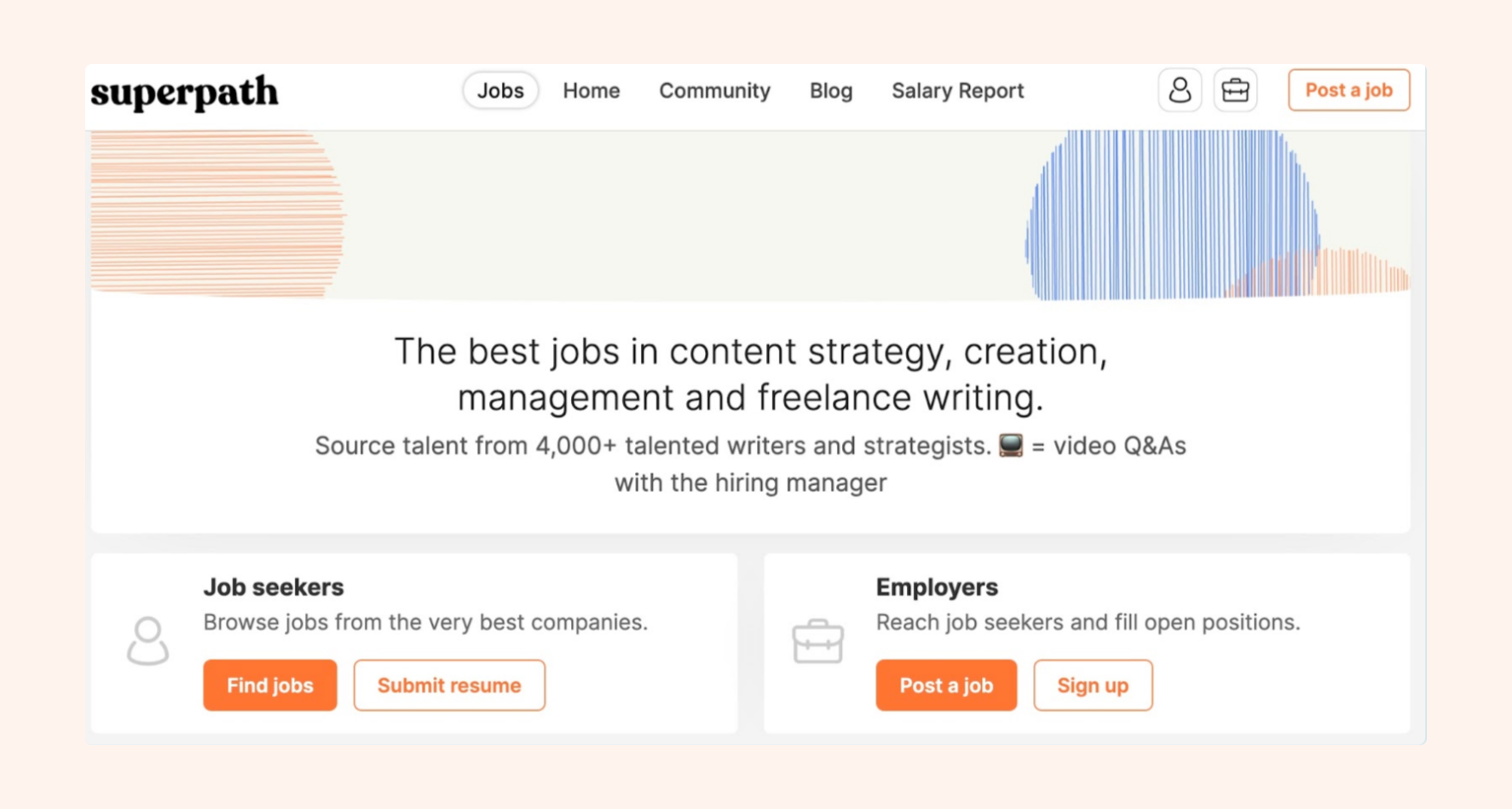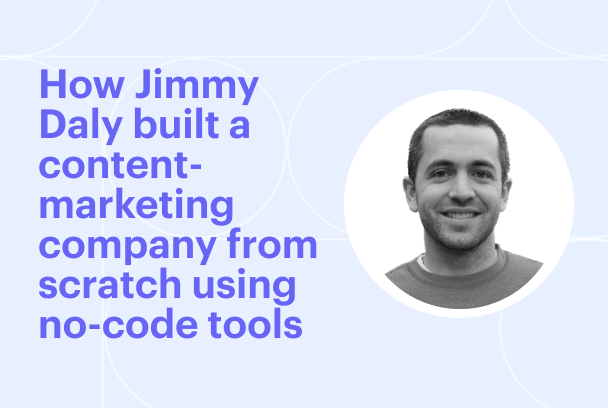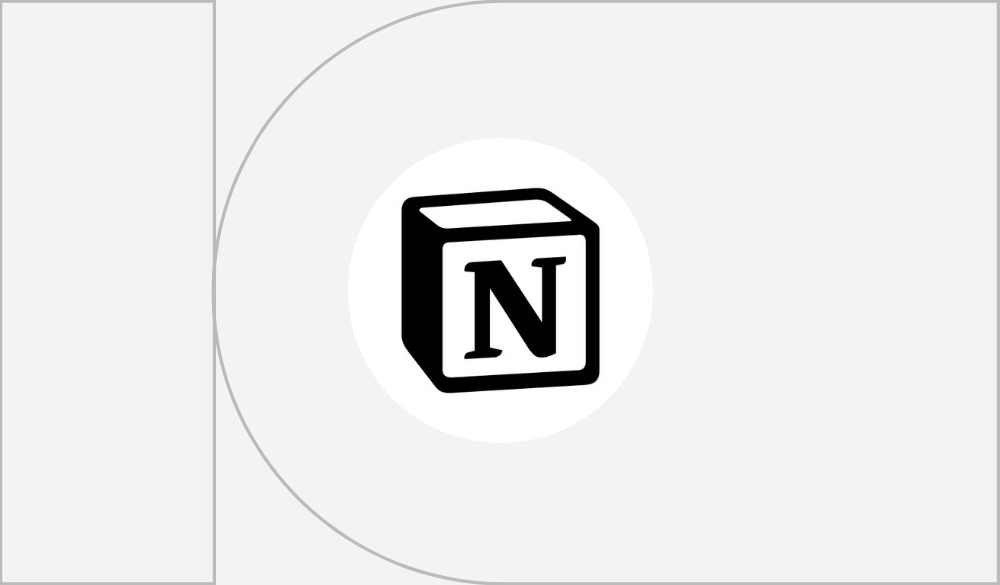How Jimmy Daly built a content-marketing company from scratch using no-code tools
We dig into how Superpath, a multi-platform marketing business, was created using no-code tools.
Table of Contents
Superpath has grown from a community on Slack into a fully-fledged business helping content marketers. It offers a job board, article marketplace and training and support. Founder Jimmy Daly has managed to do all that without a drop of venture capital cash nor a costly engineering team. How? No-code tools that have helped him test things out – and scale.
The business
‘We’re trying to bring all the smartest people in content together to see what happens,’ says Jimmy Daly. He launched Superpath originally as a Slack channel because he saw how isolated many in-house content marketers were without a place to share feedback, advice, and techniques. ‘At its core, it’s a community for content marketers to come and connect with one another, ask questions, support one another, find work, and find talent,’ he says. Joining forces with Walter Chen, the pair began building out their initial vision of Superpath, keeping costs low as they created the initial platform, intentionally avoiding involving external investors. That’s where some cost-effective no-code tools have proven to be super helpful.

'We looked at building a job board from scratch, and it was going to be wildly expensive. Then we looked at how we might put it together in Notion for $10 a month and realised it would be 90% as good and 1% of the cost.'
The problem
Their first goal was to create a place where their community of content marketers could find work. ‘We looked at building a job board from scratch, and it was going to be wildly expensive,’ says Jimmy. ‘And then we looked at how we might put it together in Notion [the note-taking software] for $10 a month and realised it would be 90% as good and 1% of the cost, so we might as well give it a try.’
They built a website on Squarespace as a home for all their services, and the first version of their marketplace on Notion, where businesses could have their article requests matched with freelance writers and editors. But as the business grew, those solutions reached their limits in terms of what they were capable of. ‘I hadn’t found an out-of-the-box product that could do exactly what I needed,' Jimmy adds. So, he started to build his own.

How he tackled it
Step 1: Building a custom marketplace with Zapier.
The first step for Jimmy was building a completely custom marketplace on top of the database they were using (on Airtable) and making sure it was entirely automated. Zapier was the tool for the job. ‘When I was first introduced to Zapier, I was like, whoa, you can do so much here. It’s crazy,’ says Jimmy. The benefits were clear – he wasn’t paying for functionality he didn’t need and he was able to customise it to how Superpath actually worked. They had a scalable marketplace that could do everything they needed it to do.
Step 2: Injecting some Superpath personality
Using Zapier and Airtable crucially allowed Jimmy to bring Superpath’s own branding to specific elements like customer portals. ‘For a very small lift, it allows us to present this more professional tool and interface to the customer,’ says Jimmy. That means a custom URL, a custom login, and using Superpath’s branding instead of a software company’s logo.
Step 3: Using no-code for internal operations too
No-code had other uses too – specifically in helping Jimmy create better systems for managing things internally. ‘No-code is beautiful for the internal operations of a company because it doesn’t have to look amazing. It just has to work,’ he says. Over time, he linked together Superpath’s systems to automate processes, handle data, and add functionality to their daily operations. ‘In a sense, the entire business is no-code because Zapier touches all of these things,’ says Jimmy. ‘It links Slack, ConvertKit, Google Sheets, Squarespace, Zoom, Loom – all of the tools that we use.’
Step 4: Spending money in the right place
Saving cash on using engineers meant Superpath’s limited budget could go to where it could make the most difference. Jimmy hired a few highly skilled freelancers to offer a high-quality product in the Superpath marketplace; developed a paid membership program that gave access to courses, office hours and one-on-one coaching; and built out a system to provide excellent customer service to the companies posting their jobs. That job board is now accessed by over 10k people looking for their next role.

Takeaways
You can use no-code to test things out
Jimmy tested, built and launched new features without hiring experts or engineers before he showed Superpath’s marketplace was viable. ‘Testing things in no-code and then making bigger decisions down the road about investment makes a big difference,’ says Jimmy. ‘I feel like I really understand the problems with the existing marketplace now as we grow. Some of those can be solved by no-code, but some of them can’t.’
It makes a huge difference when you’re on a budget
Jimmy is quick to emphasise the importance of having enough cash to pay himself a salary as the business grew. ‘I think that’s so important to call out,’ he says. ‘Not everyone’s in a position to have no salary at all as you get up and running. I certainly wasn’t.’ Saving cash – and paying himself a wage – meant he was able to dedicate his full attention to building the business and driving revenue.
But understand no-code's limitations
Unlike those that believe in the future of no-code in a philosophical way [hello], Jimmy takes a more pragmatic approach. He isn’t a no-code evangelist; he just uses it because it works. ‘If it helps us get the work done, great. If in five years we’re still doing it because it works, great,’ he says. ‘I could imagine one day we’d invest in proprietary software, we’d hire an engineer, and we’d build out an amazing product that helps us run the marketplace. Building from scratch is really expensive, but there’s a strategic benefit to it too. It helps us build a moat around our marketplace.'


Similar Tutorials
Want to read
more articles
like these?
Become a NoCode Member and get access to our community, discounts and - of course - our latest articles delivered straight to your inbox twice a month!
















